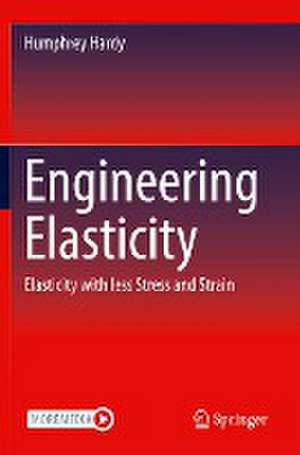Engineering Elasticity: Elasticity with less Stress and Strain
Autor Humphrey Hardyen Limba Engleză Paperback – 12 noi 2023
| Toate formatele și edițiile | Preț | Express |
|---|---|---|
| Paperback (1) | 454.16 lei 6-8 săpt. | |
| Springer International Publishing – 12 noi 2023 | 454.16 lei 6-8 săpt. | |
| Hardback (1) | 489.87 lei 38-45 zile | |
| Springer International Publishing – 11 noi 2022 | 489.87 lei 38-45 zile |
Preț: 454.16 lei
Nou
Puncte Express: 681
Preț estimativ în valută:
86.90€ • 90.73$ • 71.92£
86.90€ • 90.73$ • 71.92£
Carte tipărită la comandă
Livrare economică 04-18 aprilie
Preluare comenzi: 021 569.72.76
Specificații
ISBN-13: 9783031091599
ISBN-10: 3031091590
Pagini: 271
Ilustrații: XV, 271 p. 1 illus.
Dimensiuni: 155 x 235 mm
Greutate: 0.41 kg
Ediția:1st ed. 2022
Editura: Springer International Publishing
Colecția Springer
Locul publicării:Cham, Switzerland
ISBN-10: 3031091590
Pagini: 271
Ilustrații: XV, 271 p. 1 illus.
Dimensiuni: 155 x 235 mm
Greutate: 0.41 kg
Ediția:1st ed. 2022
Editura: Springer International Publishing
Colecția Springer
Locul publicării:Cham, Switzerland
Cuprins
Getting ready (mostly review).- Deformations.- Forces.- Force-energy relationships.- Isotropic materials.- Minimizing energy.- Simulations.- Quasi-static simulation examples.- The invariants.- Experiments.- Time dependent simulations.- Anisotropic Materials.- Plot deformation, displacements, and forces.- Euler-Lagrange elasticity.- Linear elasticity.- Classical finite elasticity .- Appendix A Deformation in jig coordinates.- Appendix B Origins of Anisotropic Invariants.- Appendix C Euler-Lagrange equations.- Appendix D Project Ideas.
Notă biografică
Dr. Humphrey Hardy is a retired Professional Engineer and Engineering Professor. He has 24 years of industry research in oil industry and 18 years of teaching undergraduate physics to engineering and physics students.
Textul de pe ultima copertă
This textbook aimed at upper-level undergraduate and graduate engineering students who need to describe the large deformation of elastic materials like soft plastics, rubber, and biological materials. The classical approaches to finite deformations of elastic materials describe a dozen or more measures of stress and strain. These classical approaches require an in-depth knowledge of tensor analysis and provide little instruction as to how to relate the derived equations to the materials to be described. This text, by contrast, introduces only one strain measure and one stress measure. No tensor analysis is required. The theory is applied by showing how to measure material properties and to perform computer simulations for both isotropic and anisotropic materials. The theory can be covered in one chapter for students familiar with Euler-Lagrange techniques, but is also introduced more slowly in several chapters for students not familiar with these techniques. The connection to linear elasticity is provided along with a comparison of this approach to classical elasticity.
- Explains ably simulation of materials undergoing large deformations
- Illustrates a simpler mathematical base to build thermodynamic and viscoelastic theories
- Describes how experimenters can make better numerical descriptions of deformable bodies
Caracteristici
Explains ably simulation of materials undergoing large deformations Illustrates a simpler mathematical base to build thermodynamic and viscoelastic theories Describes how experimenters can make better numerical descriptions of deformable bodies
